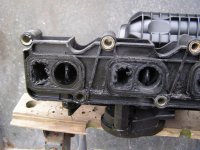Where did you get this information from...??
So many EGR problems occurs on older jtd engines, Fiat and Bosch engineers had no other option than to reduce the amount of exhaust gas passing the EGR by fitting a restrictor plate...
It wil not mix anything, but even if it should, it wouldn't make any difference in fouling the engine at all...!!
Btw, VW, Audi, Seat and Skoda can tell you what's legal or illegal on Diesel engines for sure...

There are plenty who won't agree with me, but I HATE the EGR system. It is nothing but trouble, and there are more efficient ways of doing the same job.
The EGR system is designed primarily to reduce NOx (Nitrogen Oxides and Dioxides together). NOx is produced in a diesel engine at very high temperatures - such as at peak milliseconds within the combustion chamber.
The EGR valve recycles exhaust gas, which is basically an inert gas mix, along with pollutants such as partially burnt fuel and its related solids - and this dirty mix, pouring into the combustion chamber, lowers its temperature. It’s the lower temperature that reduces NOx formation.
Unfortunately, in lowering the combustion temperature more particulates are produced, because the lower temperature makes for incomplete combustion. This reduces engine efficiency, increases wear, dilutes and acidifies the lubricating oil with carbon particulates that wash past the rings, and also shoves particulates down the exhaust pipe.
So a DPF is installed in the pipework, which in theory catches the pollutants. Crazy thing is, a DPF wasn’t needed before the advent of the EGR. In practice, the DPF blocks up, so it has to go into a ‘regen’ cleaning cycle which uses neat fuel and very high temperatures and pours out a concentrated dose of pollutants that you can see and smell! And every so often you have to buy a new DPF. Some tuners now suggest that if the EGR is deleted, there is no need to remove the DPF because it will not block prematurely.
What about the CAT? It is fitted to convert carbon monoxide and hydrocarbons (your dreaded partially burned fuel) into less harmful carbon dioxide and water. It is not an ideal solution because CO2 still adds to the problem of global warming.
Unfortunately, due partly to the actions of the EGR valve, the CAT also gets blocked up. As it gets blocked you lose power, and then you compensate by using a heavier right foot. This burns more fuel and the whole cycle gets worse and costs you money. (An easy way to check for a blocked CAT is to measure the temperature of the pipework immediately before and after the CAT with a probe. A big difference indicates a failing CAT).
So from an environmental viewpoint the EGR system has poor long-term value because it is without doubt responsible for premature wear in a number of components, which all have to be manufactured and replaced. That is why many owners go for an EGR delete. You then get cleaner burn, slightly more power, much longer engine, CAT and DPF life, together with cleaner oil and less fuel use.
Rant over.





